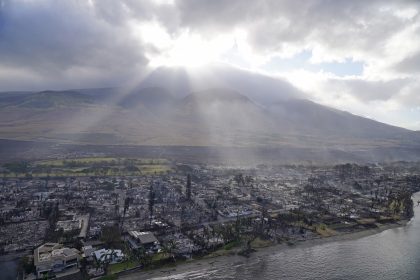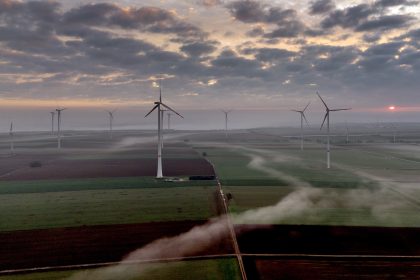Senate Seeks to Cut Greenhouse Gases While Holding On to Jobs

WASHINGTON — It was smoke and more smoke that consumed a Senate hearing Wednesday on how to prepare for wildfires and whether to grant limited exceptions to the Clean Air Act.
The four bills discussed at the Senate Environment and Public Works Committee had one common theme, namely that climate change is a disaster that is only getting worse.
“A year-by-year Band-Aid I don’t think is a solution,” said Sen. Shelley Moore Capito, R-W.Va.
She was discussing the Livestock Regulatory Protection Act, which would amend the Clean Air Act to prohibit the Environmental Protection Agency from granting exceptions for polluting emissions from livestock production. They typically consist of carbon dioxide, nitrogen oxide and methane.
The controversy — like with the other three bills — is to what extent the proposed legislation would protect the environment at the cost of jobs and potential widespread industry damage.
Carbon dioxide and methane are major contributors to the global warming that is fueling record temperatures, droughts and wildfires in Western states. As many as 82 wildfires have burned in the past few months, according to Senate figures.
Even before health consequences, the property damage alone creates a need for changes, said Sen. Tom Carper, D-Del., chairman of the Senate Environment and Public Works Committee.
“It’s in the hundreds of billions of dollars every year,” Carper said.
This year, even northern states are hitting record temperatures over 100 degrees. More than 50 million residents in Western states were under heat advisories this week.
“That’s in a bunch of places where they don’t even have air conditioning,” Carper said.
He said a “bunch of good ideas” are being offered but more are needed to confront climate change.
Another bill the committee is considering is the Smoke-Ready Communities Act. It would authorize grants to make housing and businesses more resilient to the wildfire smoke that can cause lung and property damage.
The money could be used to purchase reinforced electrical insulation, ventilators and other equipment, as well as to hire workers to install it.
A third bill before the committee is the Smoke Planning and Research Act. It would require the Environmental Protection Agency to research and mitigate the impacts of smoke emissions from wildfires.
The EPA would need to establish four Centers of Excellence for Wildfire Smoke at institutions of higher education and set up a grant program to support community mitigation efforts.
Cassandra Moseley, a University of Oregon environmental policy advisor, said wildfire smoke often hurts people worst who are least capable of protecting themselves.
“We need better techniques to empower vulnerable populations,” she said.
She added, “More and more people are going to have to learn to live with fire.”
The final bill is the Recognizing Protection of Motorsports Act, which would allow race car enthusiasts to modify vehicles for exclusive race track use. The RPM Act also would allow the manufacturing industry to sell components for the modifications to race cars.
The controversy is only minimally about high emissions from race cars but more about illegal uses of the special automotive parts needed for the conversions.
When installed illegally on household and industry vehicles, they can increase gas mileage. They also increase greenhouse gas emissions.
They are called illegal defeat devices. The EPA has accused some trucking companies of using them to save gas and to increase their revenue.
The result is “hundreds of tons of illegal pollution,” said John Walke, an attorney for the National Resources Defense Council. “This bill would make it worse.”
Scott VanderWal, vice president of the American Farm Bureau Federation, cautioned against new regulations that become too burdensome for the agricultural industry.
“A lot of smaller operations would probably just hang it up and quit,” he said.
A better option is improved technology for reducing environmental hazards and government incentives to improve productivity.
“Certainly incentives are better than a stick,” VanderWal said.
He mentioned the example of the dairy industry, which he said reduced emissions in recent years by 26% while increasing productivity 48%.
Tom can be reached at [email protected] and @TomRamstack

























